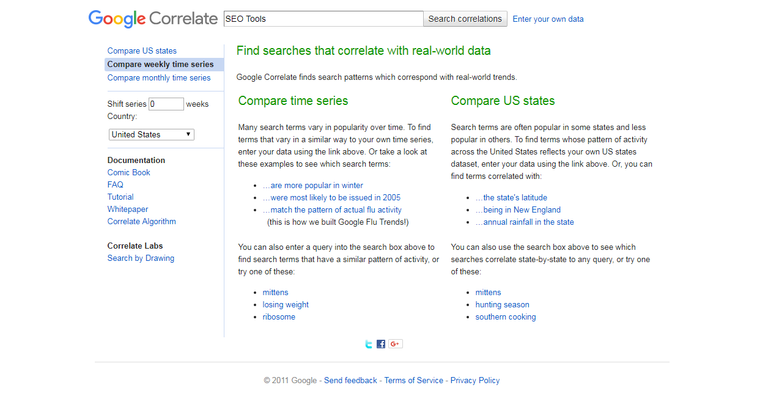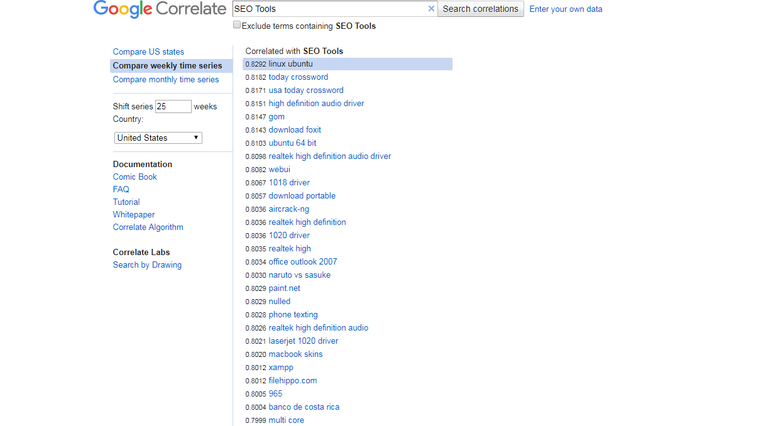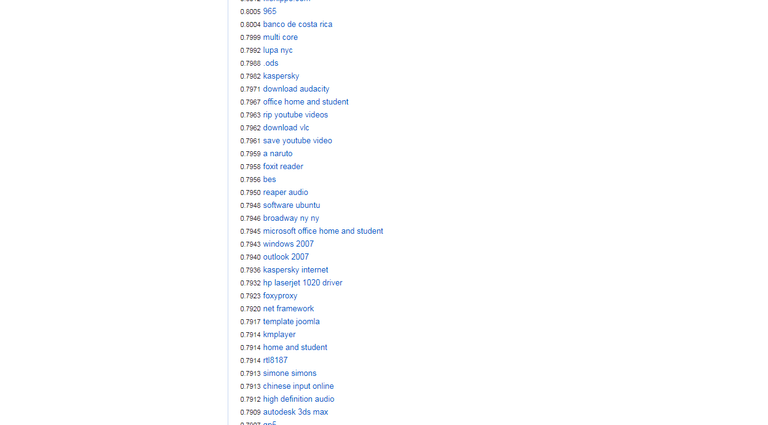
Keyword and Market Research
Do you struggle to find the right keywords to complement the marketing of your products?
Finding the right words to use on your website can be a difficult process. Finding keywords that will attract, engage and convert readers to buyers whilst boosting your rankings can be extremely back breaking, especially if you have no prior knowledge of SEO.
Well, it doesn't have to be so hard, with the right tools and strategies coming up with niche specific keyword ideas can become cheese cake.
In this write-up, I'll be taking you through the process of Keyword and Market Research using an extremely powerful yet often overlooked tool known as Google Correlate alongside the Google AdWords Keyword Planner. At the end of this post you will be able to
• Find better keywords for ranking
• Create better content strategy based on current trends
• Gain better insights about your competition
All these will be covered in the coming sections.
What is Google Correlate?
According to Google "Google Correlate is a tool on Google Trends which enables you to find queries with a similar pattern to a target data series. The target can either be a real-world trend that you provide (e.g., a data set of event counts over time) or a query that you enter." In simpler terms Google Correlate finds search patterns which correspond with real world trends.
It was developed in 2011 by Google as a tool that can look through trending patterns and return patterns matching a specified search term or uploaded data. The uploaded data is charted over time and space, how long or how far (time and space) is usually determined by the person searching for data.
Google Correlate has come to be known as the reverse form of Google Trends, yet just as powerful.
Like it's name says, it helps look for data that correlates with your data or search term over a certain period or space. This data or search term could be the niche your website covers, keywords you are trying to rank for, keywords your competitors rank for, terms related to a product you are trying to market or just about any data that will help you grow your business.
Researching Keywords
Let’s say I was trying to rank for the search term “SEO Tools”. The way I would recommend going about it using Google Correlate would be
• Head over to Google Correlate page and type in the keyword you are researching on, the time and space depends on your discretion
• Look through the list carefully and note down terms that share the most relations with your keywords
The results might look like a jumbled up list of nonsense that’s not in line with your subject matter, but it is not so, the returned list are the search queries that match the patterns projected by your own search term, in other words, they correlate. The importance of these correlations is that the searchers of all returned terms are highly probable to be interested in the data or search term you are trying to rank for. You can then use these resulting keywords to understand how to structure your contents. This will be discussed in the next section.
Creating Content Strategy
When buyers research a product they need to buy, they start by being aware of the varieties, to being interested in some of the products, then they desire a certain one and they act on that desire, this sequence of stages is known as the traditional marketing funnel.
Different stages have suitable contents that will end up drawing the buyer closer to the point where they will desire the product and act on it. A buyer in the interested stage will prefer contents on how to use the product, a buyer in the desire stage will appreciate content on comparison with other competing products and how to get a deal on the content. The product that is present in a positive light at every stage of the funnel is usually the one that ends up being bought.
Using the earlier results returned for the search term “SEO tools”, picking out some of the results that are obviously related, say for example “template joomla”. It is easy to deduce from this result that anyone searching for a term like “template joomla” is looking to develop a website using the Joomla CMS and is highly probable to be interested in knowing which SEO Tools to employ while ranking the website on search engines. This insight can then be used to develop content ideas for different stages of the “traditional marketing funnel” for the buyer in order to convince them that your product is the best choice in the market.
Competitive Analysis
Using Google Correlate for competitive analysis is easy, you just have to search for a competitor’s brand name or upload data about your competitor and see the correlations from the search results. Assuming Amazon was my competitor and I wanted to find what they’ve been up to for a while, I’d just open up the Google correlate page and type in “Amazon”. Looking through the search results it is easy to see that some of the data can easily be attributed events, products and news associate with Amazon over the period specified(though some might not be), therefore if I was looking to compete with Amazon over a product or category I have a pretty good idea where to start.
The data returned from Google Correlate can be very powerful. This tool happens to be more than just a keyword tool as it can be used for other purposes ranging from getting ideas about which products to cross-sell, researching buyer persona for certain type of products or knowing what your audience is interested during a certain period of the year at a certain place.
In this post, I’ve talked about how you can use Google Correlate in your SEO and marketing campaign to find the right keywords, create a content strategy around those keywords by using the traditional marketing funnel to determine which content fits the different stages of the buyer research and lastly, researching about your competitors and whatever they might be up to.
I hope the insights shared in this post has been helpful to your business, I would love to know if there are other ways to use Google Correlate to build a better business. Kindly share your ideas in the comments and please do not forget to upvote.
To know more about using Google Correlate as a marketing research tool the following resources are very helpful
Google Tutorial on Correlate
Google Correlate for Marketing
Google Correlate: A New Way To Research Keyword Popularity & Trends
How to Use Google Correlate for Better Keyword Research
GOOGLE CORRELATE EXPLAINED
If you’ve found this write-up to be useful in anyway to your business, kindly show your support by upvoting. Thanks



@originalworks
@OriginalWorks Mention Bot activated by @gotgame. The @OriginalWorks bot has determined this post by @gotgame to be original material and upvoted it!
To call @OriginalWorks, simply reply to any post with @originalworks or !originalworks in your message!
For more information, Click Here!
Congratulations @gotgame! You have completed some achievement on Steemit and have been rewarded with new badge(s) :
Click on any badge to view your own Board of Honor on SteemitBoard.
For more information about SteemitBoard, click here
If you no longer want to receive notifications, reply to this comment with the word
STOPThanks for the post! Is always one of the main thinks you need to take care before any online lunch. I find your post very relevant even if some one knows about SEM & SEO. Good job! Keep going!!
Thanks
Congratulations! This post has been upvoted from the communal account, @minnowsupport, by gotgame from the Minnow Support Project. It's a witness project run by aggroed, ausbitbank, teamsteem, theprophet0, someguy123, neoxian, followbtcnews/crimsonclad, and netuoso. The goal is to help Steemit grow by supporting Minnows and creating a social network. Please find us in the Peace, Abundance, and Liberty Network (PALnet) Discord Channel. It's a completely public and open space to all members of the Steemit community who voluntarily choose to be there.
This post has received a 0.28 % upvote from @drotto thanks to: @banjo.
Congratulations @gotgame! You have completed some achievement on Steemit and have been rewarded with new badge(s) :
Click on any badge to view your own Board of Honor on SteemitBoard.
For more information about SteemitBoard, click here
If you no longer want to receive notifications, reply to this comment with the word
STOPCongratulations @gotgame! You have completed some achievement on Steemit and have been rewarded with new badge(s) :
Click on any badge to view your own Board of Honor on SteemitBoard.
For more information about SteemitBoard, click here
If you no longer want to receive notifications, reply to this comment with the word
STOP